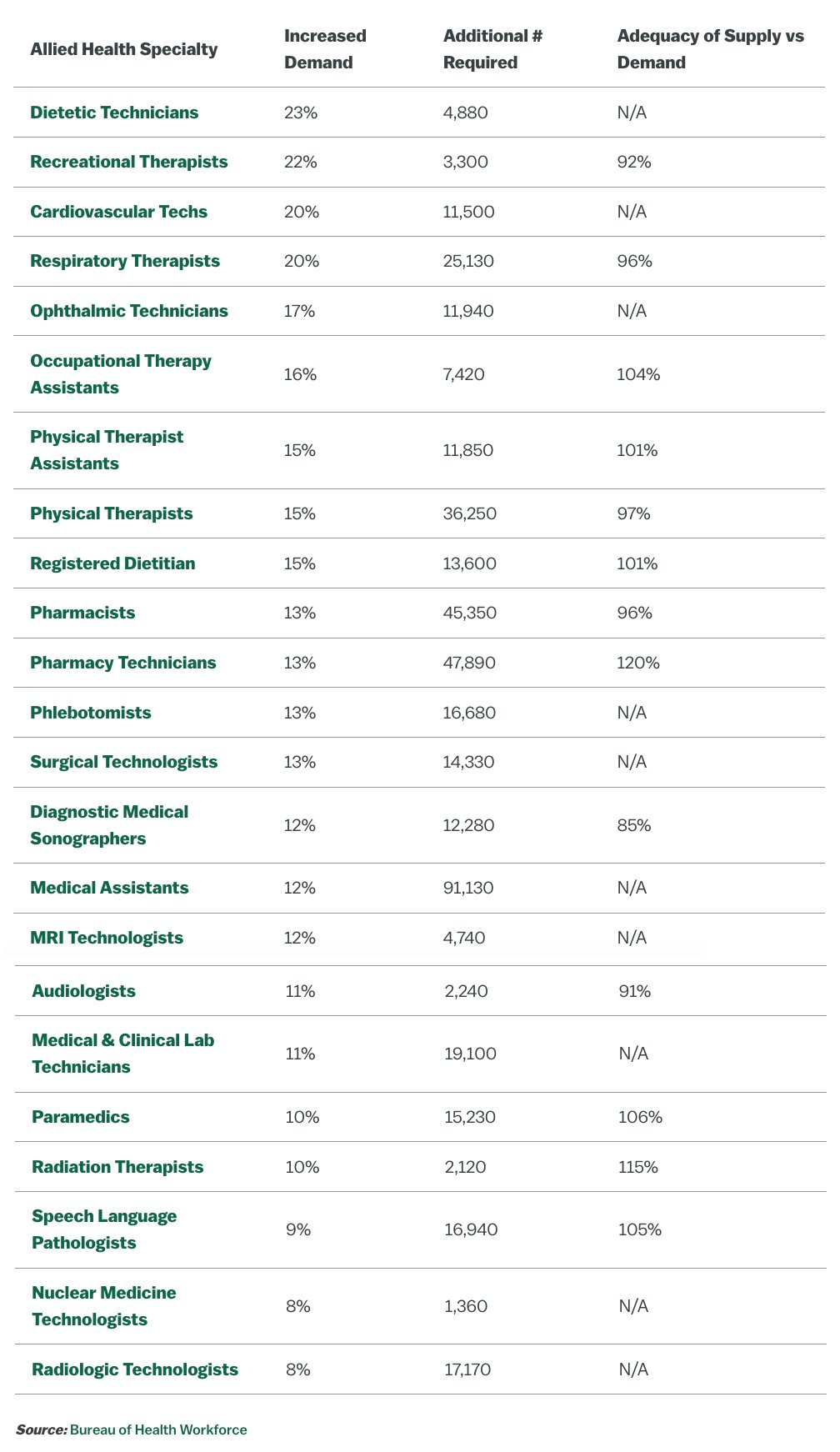Top 10 highest-paying allied health specialties for 2025

Drazen Zigic // Shutterstock
Top 10 highest-paying allied health specialties for 2025
Healthcare is a dynamic field that’s constantly evolving, and allied health professionals consistently step up to meet growing challenges. The allied health workforce is extensive, encompassing a broad range of non-nursing, non-physician roles, from radiologic technologists and respiratory therapists to dietitians and occupational therapists. Whether making advances in medical imaging technology or delivering specialized therapies that improve patient outcomes, these skilled experts play essential roles in modern medicine. With the growing demand for their expertise across hospitals, clinics and emerging fields like telehealth, many allied health roles are seeing salaries rise, Vivian Health reports.
If you’re seeking an impactful healthcare career that’s also financially stable, allied health has plenty of options. From aspiring healthcare professionals or seasoned practitioners seeking to advance their careers, this guide offers valuable insights into some of the most lucrative career paths in allied healthcare. Let’s dive into the projected top 10 highest-paying allied health specialties for 2025.
Projected Top 10 Allied Health Specialty Salaries in 2025
According to the Association of Schools Advancing Health Professions, estimates suggest that allied health professionals make up as much as 60% of the healthcare workforce nationwide. Salaries for this group of healthcare professionals vary greatly based on specialty, education, experience, facility and location.
To help determine which allied health specialties should see strong earning potential in the new year, Vivian Health’s travel salary data was used to rank the 10 roles with the highest average travel salaries over the past 12 months. Because travel rates fluctuate frequently, the rankings also include current average hourly rates for staff positions within each specialty and list the highest travel and staff salaries to demonstrate the ceiling on December 16, 2024.
1. Perfusionist
- Education Requirements: Bachelor’s and Accredited Perfusion Technology Program
- Relevant Certifications: CCP
- Average Weekly Travel Rate: $5,552
- Highest Weekly Travel Rate: $6,144
- Average Hourly Staff Rate: $89.75
- Highest Hourly Staff Rate: $95
Perfusionists, also called cardiac or cardiopulmonary perfusionists, specialize in operating and recording the output of a cardiopulmonary bypass machine, also known as a heart-lung machine. They’re responsible for ensuring essential oxygen-rich blood reaches patients’ brains and other vital organs during cardiac and other complex surgeries when the heart must be stopped, providing surgeons with a blood-free heart throughout the operation. Perfusionists regulate blood flow and temperature, monitor blood and oxygen circulation and analyze blood chemistry to make necessary adjustments and ensure patient stability during life-saving procedures.
2. Dosimetrist
- Education Requirements: Bachelor of Science in biological sciences, radiologic sciences, medical dosimetry or related field
- Relevant Certifications: CMD
- Average Weekly Travel Rate: $3,538
- Highest Weekly Travel Rate: $3,900
- Average Hourly Staff Rate: $44.05
- Highest Hourly Staff Rate: $62
As an analytical member of the radiation oncology team, Dosimetrists collaborate with radiation oncologists, medical physicists and radiation therapists to calculate optimal doses to target tumors utilizing internal and external radiation sources. They specialize in calculating radiation treatments to deliver the most lethal dose of radiation to precise parts of a patient’s body while promoting the fewest side effects to healthy organs and tissues. Dosimetrists possess advanced knowledge of anatomy, math, physics and radiobiology and use specialized computer software for treatment planning to avoid excess toxicity, improve cancer outcomes and enhance the overall quality of care in radiation oncology.
3. Pediatric Echocardiographer
- Education Requirements: Associate or Bachelor’s in Diagnostic Medical Sonography with a specialization in pediatric echocardiography
- Relevant Certifications: RDCS – PE / RDMS – PS / ACS
- Average Weekly Travel Rate: $3,139
- Highest Weekly Travel Rate: $3,404
- Average Hourly Staff Rate: $39.78
- Highest Hourly Staff Rate: $59
Pediatric Echocardiographers specialize in performing ultrasound imaging of the heart in infants, children and adolescents. They use advanced echocardiography equipment to capture detailed images that help diagnose and monitor congenital and acquired heart conditions. Their expertise ensures accurate cardiac structure and function assessments, providing critical information for pediatric cardiologists to develop treatment plans. Pediatric echocardiographers play a vital role in healthcare by delivering precise, noninvasive diagnostics essential for the early detection and management of heart issues, improving outcomes for young patients and supporting long-term cardiac health.
- Education Requirements: Bachelor’s in any life science and a National Accrediting Agency for Clinical Laboratory Sciences accredited Pathologists’ Assistant program resulting in a master’s degree
- Relevant Certifications: PA ASCP Certification
- Average Weekly Travel Rate: $2,970
- Highest Weekly Travel Rate: $3,920
- Average Hourly Staff Rate: $54.04
- Highest Hourly Staff Rate: $76
Pathologists’ Assistants are highly trained allied health professionals who work under the supervision of pathologists to examine, dissect and process tissue samples to assist in diagnosing diseases or performing autopsies. Their meticulous work dissecting tissue samples and preparing specimens for analysis is vital for accurate diagnoses and contributes to effective patient treatment plans and improved patient outcomes. By streamlining laboratory workflows and assisting pathologists in these complex tasks, pathologists’ assistants ensure a high standard of care and efficiency, making them an indispensable part of the healthcare team.
5. Pharmacist
- Education Requirements: Doctor of Pharmacy or PharmD
- Relevant Certifications: NAPLEX
- Average Weekly Travel Rate: $2,922
- Highest Weekly Travel Rate: $4,984
- Average Hourly Staff Rate: $69.49
- Highest Hourly Staff Rate: $85
Pharmacists are medication experts who specialize in preparing, dispensing and ensuring the safe use of prescription medications. Their expertise in understanding drug interactions, dosages and patient-specific needs allows them to provide authoritative guidance to patients and healthcare professionals. They’re also involved in all aspects of pharmaceutical care and the safe, rational and cost-effective use of prescription drugs. However, daily duties can vary based on their state of practice and work setting. For example, community pharmacy responsibilities primarily include dispensing medications to customers, providing prescription consultations and answering customer questions. Alternately, clinical pharmacist duties may consist of assessing, initiating, monitoring and modifying patients’ medications to ensure safety and effectiveness while collaborating with other healthcare providers.
6. Interventional Radiology Technologist
- Education Requirements: Associate / Bachelor’s from an accredited radiologic technology program
- Relevant Certifications: CI / CV / VI
- Average Weekly Travel Rate: $2,893
- Highest Weekly Travel Rate: $4,234
- Average Hourly Staff Rate: $42.65
- Highest Hourly Staff Rate: $63
Interventional Radiology Technologists, or IR techs, fulfill a vital subspecialty within the radiology field by operating advanced imaging equipment and ensuring precise execution of procedures. They specialize in using minimally invasive, image-guided procedures to assist physicians in diagnosing and treating disease in nearly every organ. Interventional procedures typically reduce risk, pain and recovery time compared to traditional surgeries. IR techs may assist in angioplasty, clot embolization, stent placement and various other procedures. Their precision and technical expertise are vital for real-time imaging that enables accurate targeting of treatment areas with minimal patient discomfort.
7. Catheterization Lab Technologist
- Education Requirements: Associate of Applied Science or Associate of Science in cardiovascular technology
- Relevant Certifications: RCIS
- Average Weekly Travel Rate: $2,800
- Highest Weekly Travel Rate: $4,423
- Average Hourly Staff Rate: $42.23
- Highest Hourly Staff Rate: $55
Catheterization Lab Technologists, also called Cardiac Catheterization Lab Technologists or Cath Lab Techs, are specialized allied health professionals who work in cath labs and play pivotal roles in helping physicians diagnose and treat heart conditions through minimally invasive procedures. They specialize in running tests to determine heart health, primarily performing cardiac catheterizations in which they thread a catheter through a patient’s blood vessel to their heart to determine whether there’s a blockage. Cath lab techs also assist in angioplasties, stent insertions and pacemaker implantations. Their expertise is crucial in ensuring patient safety and the success of intricate cardiac intervention through essential support that advances critical cardiac care and improves patient outcomes.
8. Multi-Modality Technologist
- Education Requirements: Associate or Bachelor’s in an accredited radiologic technology program
- Relevant Certifications: ABMP MRI / CT / R.T.(R)(ARRT) / ARLS
- Average Weekly Travel Rate: $2,750
- Highest Weekly Travel Rate: $3,593
- Average Hourly Staff Rate: $46.44
- Highest Hourly Staff Rate: $61
Multi-Modality Technologists are skilled imaging professionals trained to operate multiple diagnostic imaging systems, such as X-ray, CT, MRI and ultrasound. Their versatility allows them to provide comprehensive diagnostic support across various specialties, enhancing patient care and workflow efficiency. By mastering multiple modalities, they can quickly adapt to patient needs and deliver accurate imaging for diverse medical conditions. Multi-modality technologists are crucial in bridging staffing gaps, reducing wait times and ensuring timely diagnoses, making them indispensable in various medical settings. Their flexibility and expertise improve both patient outcomes and operational performance.
- Education Requirements: Associate Degree in Cardiovascular Sonography
- Relevant Certifications: RDCS – AE / RDCS – PE / RDCS – FE
- Average Weekly Travel Rate: $2,735
- Highest Weekly Travel Rate: $3,502
- Average Hourly Staff Rate: $53.57
- Highest Hourly Staff Rate: $72
Echo Technologists, or Echocardiographers, specialize in performing ultrasound imaging of the heart to assess its structure and function. Using advanced echocardiography equipment, they capture detailed images that help diagnose heart conditions like valve disorders, heart failure and congenital abnormalities. Echo technologists work closely with cardiologists to provide accurate and real-time imaging critical for developing treatment plans. Their expertise ensures noninvasive, reliable diagnostics, which is key in detecting and monitoring cardiovascular issues. By delivering precise imaging, echo technologists contribute to early diagnosis, effective treatment and improved outcomes for patients with heart-related conditions.
10. Vascular Interventional Tech
- Education Requirements: Associate in Vascular Technology or Bachelor’s Degree
- Relevant Certifications: RVT
- Average Weekly Travel Rate: $2,734
- Highest Weekly Travel Rate: $4,320
- Average Hourly Staff Rate: $36.44
- Highest Hourly Staff Rate: $49
Vascular Interventional Technologists assist physicians in performing minimally invasive procedures to diagnose and treat vascular conditions. They use advanced imaging techniques like fluoroscopy, ultrasound and CT to help guide catheters, stents and other tools through blood vessels. Their expertise supports angioplasty, embolization, thrombectomy and similar procedures that restore blood flow and treat vascular diseases. Vascular interventional techs ensure accurate imaging, patient safety and procedural efficiency, making them essential for delivering precise, life-saving treatments that reduce recovery times and improve outcomes for patients with vascular conditions.
Increased Demand for Allied Health Workers
The growing demand for allied health workers is fueled by a combination of factors, including an aging population, technological advancements in healthcare and interest in preventative health measures. While increased demand doesn’t always correlate to higher wages, an abundant need for allied health workers in a specific field may give you some bargaining power when negotiating your salary. Conversely, fields where supply outweighs demand may lower your ability to negotiate salary.
The National Center for Health Workforce Analysis (NCHWA) projects shortages in many crucial allied health fields through 2037. The NCHWA anticipates shortages of respiratory therapists, pharmacists and physical therapists, among others. Between 2022 and 2037, Bureau of Health Workforce projections indicate an increased demand of 22% for allied health workers overall, but the degree of increase varies by specialty. The following table indicates the highest demand increases by specialty during this 15-year span, potentially leading these and other specialties to be among the fastest-growing healthcare careers.
![]()

Vivian Health
Earn Higher Pay through Certification
Some states may require professional certification as part of the licensure process, where allied health professionals within specific fields must become licensed before practicing. Even where allied health certifications are voluntary, earning certifications can open the door to higher-paying allied health jobs, as many employers prefer to hire certified healthcare professionals.
This story was produced by Vivian Health and reviewed and distributed by Stacker.